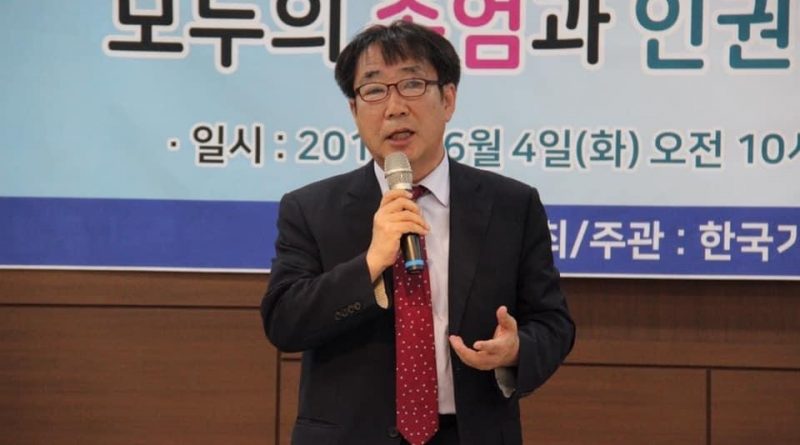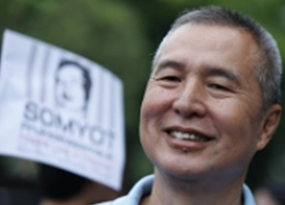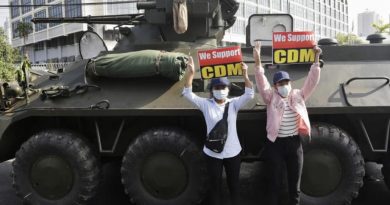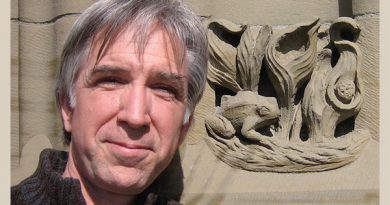An Overview of the Current Human Rights Situation in Philippines
Rev. Jeong Jin Woo (Chair, International Coalition for Human Rights in the Philippines, Korea)
Despite the consistent imperial invasion and exploitation by Spain, the U.S. and Japan, Philippines was one of the wealthiest countries in East Asia following World War II. However, having failed to resolve the long history of political and economic conflict, a downturn began and it still continues to plunge. Amidst the situation, the fight for justice and democracy by the people persisted. Previously having forced out through mass-movement the dictator, president Marcos in 1986 and Estrada who was suspected of corruption, Filipinos are carrying out the same hard fight against Duterte, whose violence knows no bounds.
The Duterte administration began in May 16, 2016 with fervent support from the people yearning for the end to the deeply rooted corruption in Philippines. Duterte was not from the political mainstream, the oligarchy group Olakiki centered in Luzon Island, but was a Visayan using his anti-corruption image accumulated over the 20 years in which he was mayor of Davao, South Mindanao. With this clean image, Duterte was able to achieve an election landslide victory as the Philippines’ first leftwing president.
For his first SONA (State of the Nation Address), Duterte invited the leftist organization Bayan, the labor union KMU, the progressive group Karapatan (Alliance for the Advancement of People’s rights) to his palace and declared a policy of talks and embracement. Duterte’s unprecedented actions raised the expectation and hopes of the citizens and progressive groups of Philippines. With the government’s most critical parties, Duterte adhered to progressive agendas such as poverty eradication, territory issue, foreign intervention and true agricultural reform, state industrialization and termination of part-time workers.
The citizens’ expectations rose further when Duterte nominated leftwing, progressive individuals such as Anakpawis to the congress, and it seemed as if Duterte was set on understanding the roots of the issues that troubled the citizens and resolving the root causes of the 50-year-long armed struggles. Before his SONA in July, Duterte sent a special envoy to Netherlands where he met the leader of the National Democratic Front of the Philippines (NDFP) to discuss on resuming peace talks. As part of a reconciling gesture for the peace talks, he released at least 20 political prisoners and NDFP peace consultants for their participation in the peace talks held in Oslo on August, 2016.
But such dovish policies did not last long and Duterte started to become anti-people as the drug war kicked off. It is becoming clear that the drug war, instead of living up to its name, targets those working with the poor, workers, farmers and the natives. According to UNHCR’s report on the current human rights situation in the Philippines (June 4, 2020), a minimum of 8,600 people were murdered by the police and the army, and human rights activists claim that the number may actually reach to 30,000.
The Duterte administration has currently embarked on stabilizing a long-term rule through Constitutional reform. Peace talks with the NDFP have halted, and as an excuse to prevent violence and terror, after the announcement of a full-scale war policy in 2017, large scale military operations were carried out at Bicol, Samar and Negros (Memorandum 32) where innocent farmers were massacred. In addition, the national task forces created to supposedly end violent conflict with regional communist forces intensifies the existing violence against people.
Following the declaration of the martial law and devastation of Marawi Island in 2017, there has been frequent infringement of human rights ranging from forced elimination, arrest, detention to illegal murder and the task force team is monitoring, arresting and detaining members of legal organizations, churches and ecumenical groups along with various human rights and peace activists through “red-tagging.” Furthermore, the police and army are suppressing anti-government individuals and groups by issuing search warrants based on false evidence, and accordingly the number of political prisoners has exceeded 6 million nationwide.
During the recent COVID-19 crisis, the Duterte administration continued to suppress human rights and satisfy his political interests instead of focusing on disease prevention. Philippine‘s most popular TV network, ABS-CBN (Channel 2) was shut down for being critical of the government, and there are now attempts to enact an anti-human rights act that may lead to arbitrary exercise of investigative power and halt of Constitutional values. Amidst the Covid-19 crisis, Philippine‘s democracy and human rights is facing a significant challenge never encountered before.
But the people of the Philippines have not given up despite such severe oppression and suppression. There is a strong will to overcome differences between parties through solidarity and cooperation in order to save democracy. With great strength, people continue their march towards justice and peace.




